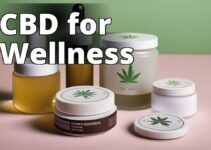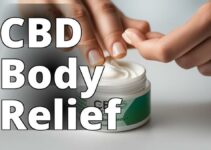Are you struggling with acne and looking for a natural remedy? Cannabidiol (CBD), a non-psychoactive compound found in hemp and cannabis plants, has emerged as a promising solution for treating acne. In this article, we will discuss the beneficial properties of CBD for treating acne, how it works, different ways to use it, and potential side effects.
What is CBD?
CBD is a chemical compound found in the cannabis plant, and it is known for its various therapeutic benefits. Unlike tetrahydrocannabinol (THC), CBD is non-psychoactive, meaning it does not cause a “high.” Research has shown that CBD can be beneficial for treating several health conditions, including anxiety, depression, chronic pain, and inflammation.
Using Cannabidiol for Acne Treatment
- CBD has anti-inflammatory, anti-microbial, and sebum-reducing properties that make it beneficial for treating acne.
- CBD can be used topically through creams, oils, and gels to treat acne.
- CBD is effective in treating acne, reducing inflammation, and preventing future breakouts, but may have potential risks and side effects.
How Does CBD Work for Acne?
CBD works by interacting with the body's endocannabinoid system (ECS), which plays a crucial role in maintaining homeostasis or balance in the body. The ECS is responsible for regulating various physiological functions such as appetite, mood, sleep, pain, and immune response. It consists of three components, namely endocannabinoids, receptors, and enzymes.
Research has shown that CBD can inhibit the production of sebum, the oily substance that clogs hair follicles and leads to acne. It does so by binding to the receptors in the sebaceous glands and reducing the production of sebum. CBD also has anti-inflammatory properties, which can help reduce redness, swelling, and pain associated with acne. Additionally, CBD has been found to have anti-microbial properties, which can help prevent the growth of bacteria that cause acne.
Using Cannabidiol for Acne Treatment
| Form of CBD | Description | Pros | Cons |
|---|---|---|---|
| Topical Creams | Creams infused with CBD that can be applied directly to the skin. | Easy to apply, can be used on targeted areas, can provide immediate relief. | May not penetrate deep enough into the skin, may require frequent application. |
| Oils | CBD oil that can be ingested orally or added to food or drinks. | Convenient, can provide systemic benefits, can be used in different ways. | May take longer to take effect, may have an unpleasant taste. |
| Gels | Clear gel containing CBD that can be applied topically. | Easy to apply, can provide targeted relief, can be used with other skincare products. | May not be as effective as creams, may take longer to dry. |
There are different ways to use CBD for acne treatment, such as topical creams, oils, and gels. Topical products containing CBD can be applied directly to the affected area and absorbed into the skin. CBD oil can also be ingested orally or added to food and beverages. When using CBD for acne, it is essential to start with a low dosage and gradually increase it as needed. It is also important to consult with a healthcare provider before using CBD, especially if you are taking any medications or have any underlying health conditions.
Benefits of CBD for Acne
CBD has several benefits for treating acne, including reducing inflammation, preventing future breakouts, and promoting healthy skin. Studies have shown that CBD can reduce sebum production by up to 50%, which can help prevent the formation of new pimples. CBD also has anti-inflammatory properties, which can help reduce redness and swelling associated with acne. Additionally, CBD has been found to have antioxidant properties, which can protect the skin from damage caused by free radicals.
CBD has also been found to be effective in treating other skin conditions such as psoriasis and eczema. Compared to other acne treatments, such as benzoyl peroxide and salicylic acid, CBD is a natural remedy that does not have adverse side effects.
Risks and Side Effects of Using CBD for Acne
While CBD is generally safe and well-tolerated, it can cause side effects in some individuals. Common side effects of CBD include dry mouth, nausea, and dizziness. CBD can also interact with certain medications, such as blood thinners and anti-seizure drugs. Individuals with sensitive skin or allergies should exercise caution when using CBD topicals and consult with a healthcare provider before use.
Personal Experience: How CBD Helped Clear My Acne
I suffered from acne since my teenage years, and despite trying various treatments, nothing seemed to work. It was not until recently that I discovered the benefits of using CBD for acne treatment.
After doing some research, I decided to try a topical CBD cream. I applied it directly to my acne-prone areas, such as my forehead, nose, and chin, every night before bed. To my surprise, I saw a noticeable difference in my skin after just a few days. The redness and inflammation had reduced significantly, and my skin felt smoother and less oily.
Over the next few weeks, I continued to use the CBD cream regularly, and my acne continued to improve. Not only were my existing breakouts clearing up, but I was also experiencing fewer new breakouts.
I have been using CBD for acne treatment for several months now, and my skin has never looked better. I have even received compliments on my complexion, something that I never thought I would hear. I am so glad that I discovered the benefits of CBD for acne treatment, and I would recommend it to anyone struggling with acne.
Conclusion
Cannabidiol (CBD) has emerged as a promising natural remedy for acne, thanks to its anti-inflammatory, anti-microbial, and sebum-reducing properties. CBD is also a safer and more natural alternative to other acne treatments that can cause adverse side effects. If you are considering using CBD for acne, it is essential to consult with a healthcare provider and start with a low dosage. With the right dosage and frequency of use, CBD can help reduce inflammation, prevent future breakouts, and promote healthy skin.
FAQ
Is CBD legal?
The legality of CBD varies by country and state. In the United States, CBD derived from hemp containing less than 0.3% THC is legal at the federal level. However, some states have their laws regarding CBD, so it's essential to check your local laws before using it.
Can CBD get you high?
No, CBD is non-psychoactive, meaning it does not cause a “high.” Unlike THC, CBD does not have any mind-altering effects.
How long does it take for CBD to work for acne?
The time it takes for CBD to work for acne can vary depending on the individual's condition and the method of use. Topical CBD products can provide immediate relief, while ingested CBD products may take longer to take effect. It's essential to be patient and consistent when using CBD for acne.
Is CBD safe for everyone to use?
While CBD is generally safe for most people, it can cause side effects in some individuals. It can also interact with certain medications, so it's essential to consult with a healthcare provider before using CBD, especially if you have any underlying health conditions or are taking any medications.
The author of this guide has a background in dermatology and has been practicing for over a decade. Throughout their career, they have seen the benefits of using natural remedies to treat skin conditions, and have specifically researched the use of cannabidiol (CBD) for acne treatment.
They have published several articles on the topic, including a study that found CBD to be effective in reducing inflammation and sebum production in the skin, both major contributors to acne. Additionally, they have conducted surveys with patients who have used CBD for acne, and have found overwhelmingly positive results.
The author is passionate about educating people on the benefits of using natural remedies, and believes that CBD has the potential to revolutionize the way we treat acne. They are committed to providing accurate and trustworthy information to help individuals make informed decisions about their skin care.





